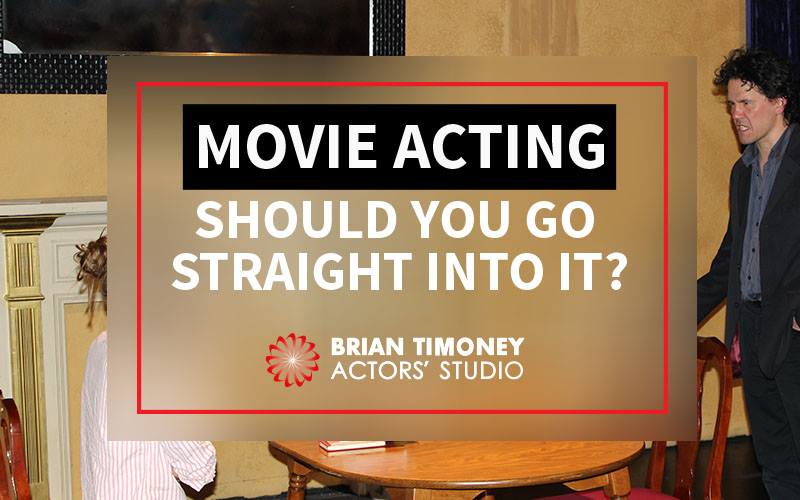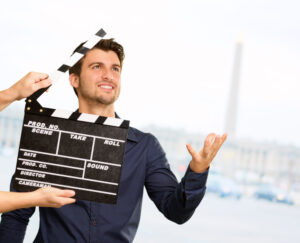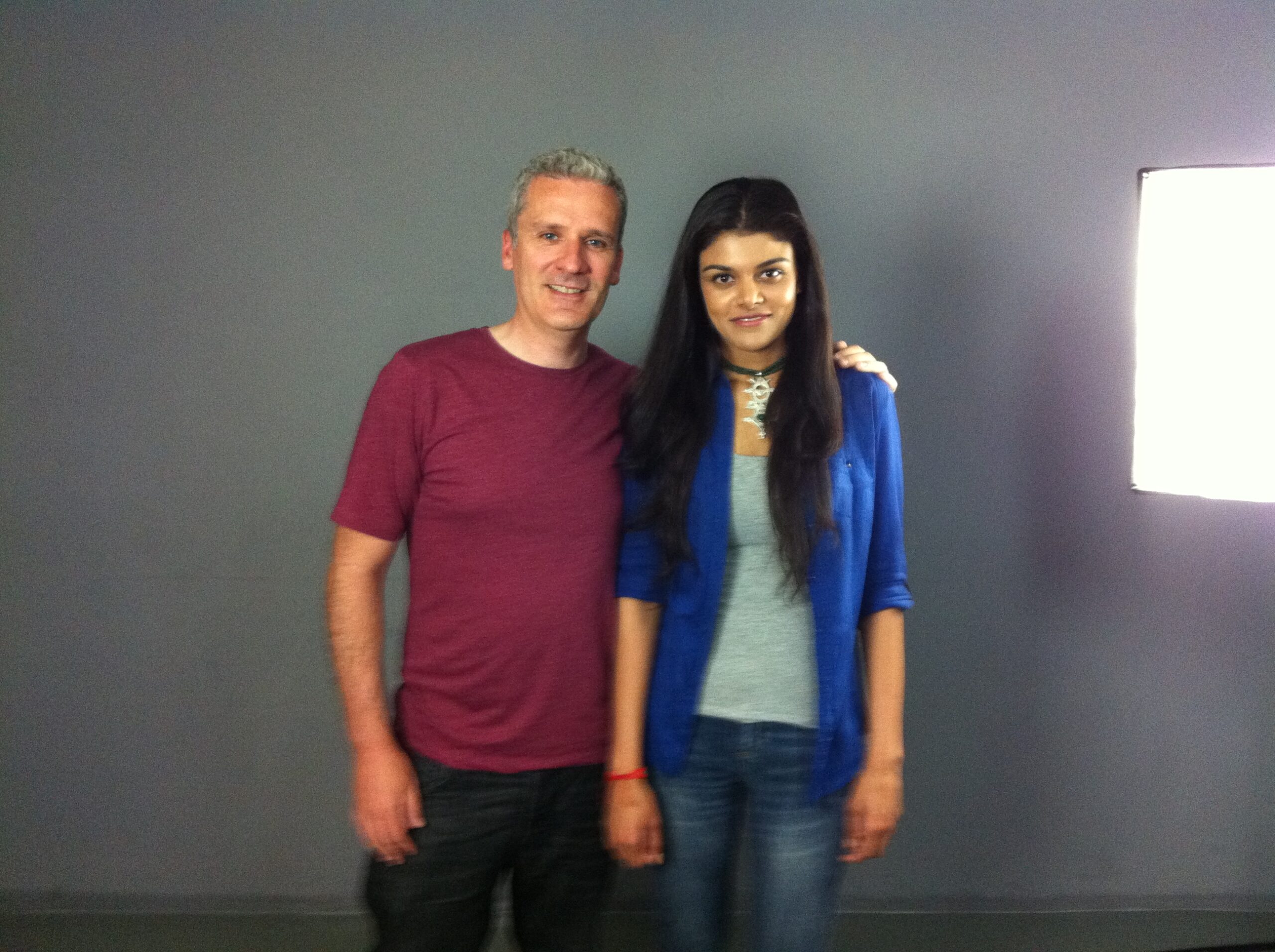The steps you take in the first stages of your acting career will have a huge impact on your entire acting future. One of the most important decisions you can make when embarking on your journey to becoming a professional performer is whether or not to go directly into movie acting.
Stage, television and movie acting will all require you to learn different techniques and adapt to the unique styles of each medium. From voice modulation and breathing techniques to learning how to work with cameras as opposed to audiences, there are several major differences in these different forms of acting.
The first thing to remember is that there are around 38,000 working actors in the UK. However on average, only one in 50 makes more than £20,000 per year. This is why it is so vital that you know exactly what part of the industry you want to join and that you hone and perfect the skills specific to your acting style.
Successful actors are few and far between because star quality is hard to come by. When an actor has star quality, audiences, directors and casting directors know it. If you do decide to go straight into movie acting, then you will need to know exactly how to work with cameras, set lighting and, most importantly, have the skill-set and ‘star quality’ to engage movie audiences, hold their attention and make them believe in the emotions you portray on screen.
What Makes Movie Acting Different?
If you were to start out by acting in theatre or on television, you would learn to develop your character through the rehearsal process. However, according to actor and director, Ben Miller, when acting in a film role, you must spend the entire process becoming your character. In an interview with The Guardian, Ben Miller describes the movie acting process as one in which you;
“live and breathe the character”.
He also says that filming a movie creates an atmosphere which makes this as easy to do as possible.
Movie actors are often required to prepare for a role more thoroughly than actors preparing for smaller roles. This means that as well as reading scripts and memorising lines, you will have to look at your character in-depth and really try to work out the basis of their behaviour and create a fully rounded personality. For example, if you were to play a character from history, you would start by reading up about that person and learn about them in as much detail as possible. If you were cast in the role of an evil antagonist, you might want to think about why this person behaves the way they do- no matter how unsympathetic they might seem at first glance. If you don’t put this sort of research into your role, you might find that the final result ends up quite flat and not believable to the audiences watching the movie.
In his 1990 book, Acting in Film: An Actor’s Take on Moviemaking, the iconic British movie star Michael Caine goes into great detail about the aspects of movie acting that make it different to other styles of performance. He explains how the technology used in film, which allows viewers to see an actor’s face in extreme close-up and hear even the slightest sounds they make, means that movie acting can be portrayed much more subtly. He describes how it is much more truthful and potent for a big screen actor to downplay their emotions.
Michael Caine isn’t the only person to note the difference sort of acting that movie roles requires. In the 1952 thesis; Theory of the Film, Bela Balazs attribrutes the power of movie acting to the close up. He says that the close up causes a subtle style of performance, the likes of which had not been seen before in theatre acting. Balasz calls this the ‘polyphonic play of features’. Similarly, Walter Benjamin also points out the uniqueness of movie acting in his famous 1936 essay, The Work of Art in the Age of Mechanical Reproduction. Benjamin believes that the difference lies in the fact that the performance in a movie is not happening live. This means that the actor cannot adjust their performance to suit the audience.
Both of these are examples of very early acting theory, which goes to show that even in the earliest days of cinema, experts were making note of the difference in stage and screen acting- particularly the fact that the technology, production and editing techniques used in film production play a big part in the way stars act.
The Art of Movie Acting
If you decide to dive straight into movie acting, there are a few things you need to know first. For example, you will film scenes individually and separately from the other actors. This means that you won’t get a chance to watch the entire story unfold like you would in a play. Because of this, some actors may need help from the director to see how their character fits within the wider story as a whole. Taking the time to do this can make a big difference to your performance, even if you only have a small part.
Movie acting is all about ‘hitting the mark’. Film sets are organised very carefully. The lights, cameras and all objects in the scene will be positioned very precisely. This means your movements will be carefully constricted. You will need to stand and move in exactly the way that the director tells you to. Usually, the floor of a movie set will be marked with tape to show actors where to go. This is where the term ‘hitting your mark’ originates.
Movie actors also need to know how to work with cameras. Every time you act in a film scene you should be aware of the type of shot a director wants. A few kinds of shots you’ll work with include extreme close ups, close ups, long shots, over-the-shoulder shots, high angle shots and dolly zooms.
Movie Acting – Should You Go Straight Into It Or Not?
Every person wants to start their career as they mean to go on, and with an acting career it’s no different. However, the question of whether or not to go straight into movie acting is one that you will need to think about. The movie industry is a sector that the majority of actors dream of being in, due to the fame, glamour and the fact that they expect the pay to be significantly higher. However, in reality, if you go straight into movie acting you should be prepared for smaller parts and low paying roles. In the early stages of your career you will need to focus on building up experience by accepting smaller parts. This might seem disheartening at first if you have dreamt your whole life of being a film star, but it will make you a better-rounded performer and build a foundation for your career in the long term.
Some new actors believe that they have to get stage acting experience before they are able to make the switch to performing on the big screen – but this doesn’t necessarily need to be the case. You will need to work your way up through the ranks of the film industry before ever landing a larger role, but it is very possible to begin your career in movies. If you were to pursue a career in film after working on stage for some time, you would be close to starting all over again from scratch. This is because the two mediums are so very different- as are the skills they respectively require.
Many actors prefer to accept as many acting jobs as possible, on stage or on screen, in the early stages of their career, while others prefer to stick steadfastly to their chosen forum. To decide what’s right for you, you will need to spend some time working out which areas of acting excite you most and which you excel in. You might want to speak to your agent or acting coach about this. Some questions that frequently pop up about whether or not it’s best to go straight into movie acting include:
- What type of training are you going to undertake?
- How much do you understand about the entertainment business and how it works?
- How will you go about finding auditions and applying for them?
- Which kind of acting appeals to you most- film, theatre, television etc?
When you’ve really researched these questions, you can make an informed decision about which acting route is right for you. You will then be able to create serious goals for yourself.
Start Your Acting Career
Whether or not you go straight into movie acting is a decision that only you can make and the decision will be totally personal to you. Whichever you decide, it is important to remember that there is no easy route or fast track to becoming a successful star.
When you apply to join one of Brian Timoney’s acting courses, such as the Ultimate Acting Programme or the Introduction to Method Acting Bootcamp will provide you with enough tools and insider information to get your career off to the best possible start.
Brian will teach you not just about the techniques of method acting, and how to draw upon them to enhance your performance, but he’ll also teach you about the business of acting too. This is an absolutely fundamental aspect for any aspiring actor who is serious about making it in this highly competitive industry – particularly when it comes to movie acting.
“He’s a natural born actor” is a statement you’ll often hear in the acting profession and it’s a big fat lie. It reinforces the misconception that acting is something that can be done well with no training.
I cannot count half a dozen professional actors that have never had any sort of skill development. It doesn’t matter if they got into the profession at an early age or if they were picked off the street for a role, you need to learn in order to be successful.
You wouldn’t want a surgeon operating on you that didn’t feel they needed a lot of schooling would you? Equally, an audience won’t pay to see actors that don’t think they need acting courses in order to improve. And make no mistake, the audience will notice; as will those holding auditions. It’s not about your CV, they’ll be able to tell almost instantly that you haven’t honed your craft.
Good drama schools have developed proven methods to bring out the best in their students. They are in the business of turning those students into professionals because they know that if they cannot deliver these results, they won’t survive. The intelligent actor will recognise this and take full advantage of all available resources in order to make them the best they can be and, ultimately, allow them to make a good living doing what they love.
You cannot learn to drive a car without learning the rules, the skills, and practicing. Acting is the same; you need to learn, practice and perfect.
I know it’s a cliché, but it still rings true:
You only get out of something what you put into it.
Make certain you put everything you have into making yourself a student of acting. Research acting schools, sign up and participate in acting classes and learn important skills (like method acting).
Another important point is that, unlike driving etc., acting isn’t something you ‘learn’ and then move on from. It’s a skill that needs to be constantly developed. Expanded. It doesn’t matter if you’ve been acting for 30 years, you still need to keep your skills fresh.
Want to hear the words ‘you’re a natural’ at your next audition? Maybe the key is in finding the right acting training. We run a range of method acting courses designed to give you the practical skills you need to succeed as an actor. Want to know more? Why not give us a call?
Why Do You Act?
In our method acting courses we often teach the importance of remembering what you want. For most actors the answer is simple: we want to tell stories.
We’ve all had the experience of losing ourselves in a good book, a good movie, or a good show. We identify with a character. We’re pulled along with that character through triumphs, disappointments and ultimately, growth. When the book, movie, or show is over, we feel satisfied.
In acting, you get to be that character in the book, movie, or show. It’s the closest thing to virtual reality entertainment that we have today.
In method acting, you not only get to be the character, but you also get to delve beneath the surface of the character until you finally reach yourself. You get to examine yourself in ways that only acting classes or decades of expensive therapy can allow.
What’s Your Purpose?
At your finest moments, there is a transcendence that we reach as actors, particularly those of us who use method acting. There is a marrying of your inner self with the self of the character. There’s a merging of you with the character that becomes, in essence, a version of you in the story.
Most people never get to experience this. The best they can do is read a good book, go to a good movie, or watch a good show. Some of them dream of going to drama school or taking acting classes somewhere, but most have other passions in life that take them in other directions. As actors, we are lucky enough to have this experience everyday if we want it.
At the end of the day, the doctor who has cured a patient, the researcher who has got one day closer to a cure for cancer and the lawyer who has got an acquittal for an innocent client – all of them want to relax after work. Most of them will pick up a book, grab the remote or go out to the cinema with their friends. They will immerse themselves in the stories of characters. This could be YOUR character.
Granted, you’re more likely to be pulling them along with you in the story if you’re a lead or a major supporting character. However, even as a nameless co-star you’re egging the story on – and who’s to say your nameless character with two lines doesn’t have a story of his or her own? That’s all up to you.
Go ahead and make up a backstory for your food server. I’m not suggesting you force it into the scene to the point that it pulls focus from the leads, but have it in your own head as a private character fantasy. I promise you it’ll be more fun. Pretend there’s a show somewhere about you, and this is just what your character does when you’re not delivering lines in that show.
If you’re old enough to remember the Friends episode with the crossover with the women from Mad About You, you have a perfect example. The two women walk into Central Perk for a simple coffee. All they have to do is order their coffee and cookies. A gripping storyline that will transform your life? No. But in a Mad About You episode, this scene might have taken place off camera. It might have been something the two women did while we were watching another more pivotal scene.
In acting, you get to be in a story. Even better, you get to help create that story using your most powerful tool – yourself. As a bonus, you get to pull that doctor, that lawyer, that factory worker, and that full-time mum in the audience with you into stories they don’t get to enter into without your help. You fill a need that we all have – the need for myth, for entertainment and for story.
That’s what you do. That is the purpose you fulfill.
Now go ahead and replace those ink cartridges.
Want to know more about the process of acting? Need some acting inspiration? Have you read about my acting courses?
Targeted Marketing
I’d like to introduce a concept that people in the corporate world have known for ages. It’s called targeted marketing.
How do you feel when you get a brochure left on your car that advertises the next greatest burger place in London? Here’s what I feel these ads are saying to me: “Hi, random car owner, I don’t know you and I don’t know anything about you, and I don’t care, but look, I made these burgers, and I hope you’ll buy some.”
This is a spectacular failure to impress me. For one thing, I don’t like burgers.
It’s a very different feeling when my phone company rings me up and says, “Good afternoon, Mr. Timoney. I see that you make a lot of calls to Scotland. Are you aware that we have a flat-rate discount plan that could mean you pay about 60% of what you’re paying now?”
Okay, I’m listening.
Know Your Buyer
In method acting classes you learn to know yourself. In the business of acting that’s important; but it’s also important to know the buyer.
Firstly, identify your primary and secondary types. What roles would you expect to play? If you had one line on a show, how would you dress for it? What would your character’s job be? Do you play teachers? What type of teachers? Do you play the bad guy? Are you the sweet, nurturing mom or the no-nonsense disciplinarian mom? You need to know and understand what you can most naturally deliver.
Secondly, watch TV shows. Watch the current season of any TV series that’s filming in your area. Find out where your primary type lives – in roles that are at your current tier or above. If you’re straight out of drama school and going for co-star roles – meaning the characters with job titles instead of names like waiter, doorman, Cop #2 and the like – then watch the current season to see how those characters vibe. For instance, Ray Romano is a loveable comedy character, but I couldn’t really see him on a CSI show. A cop on Flashpoint is very different from a cop on Mike and Molly. Watch these shows and try to spot someone like you in a role you would like to have.
Find out who casts those shows. Go to IMDB and find the casting director for the current season. Mark this person’s name down and keep him or her on your list of people to target.
Find out who reps the people cast in roles you could play. The paid subscription to IMDB Pro lets you in on a great deal of production info that you don’t get with the free trial. You get to look up locations, production notes, and for your purposes here, the agents of actors close to your type being cast at your next tier. Write these agents’ names down.
Before long, you’ll start to see patterns emerge. You’ll notice that certain casting directors tend to go to certain agents. Certain directors work with the same people. Start keeping a record of these relationships. Set up Google alerts for these people – the more you know about them, the better. When you get an alert that they’re speaking at an event, giving a presentation or offering an acting class; you go too. Slowly get to know these people. Build relationships with them.
Keep the information in one handy catch-all place – be it an Access database on your computer or a binder full of hand-scrawled notes. Keep it organized by name. Then when you’re about to meet the person, you can walk into that contact with more confidence. I’m not suggesting that you go up to a potential agent and immediately mention the school their five-year-old attends – let’s not get creepy – but at least learn whatever you can learn, and keep it to yourself. You never know. The information may come in handy in conversation.
Targeting your efforts is a great way to increase the results you get from your hard work. Work hard to focus your efforts. Don’t be the guy that left the burger flyer on my car. Know your buyer.
Want more practical, actionable advice that’ll help you make a living as an actor? Have you heard about my Ultimate Acting Programme?
When someone watches you, you change.
Research conducted in the personal training industry has discovered that when someone is simply watched while they work out, they greatly increase their efforts.
This is bad news for actors.
How to Avoid ‘Overacting’
I say ‘bad news’ because an unjustified increase in effort leads an actor to FORCE their performance.
This is also called overacting. It doesn’t have to be real ham acting to be considered ‘overacting’. It can simply mean giving too much energy to the task in hand.
In The Method, we have a special exercise to combat this.
It’s called ‘A Private Moment’. In this exercise the actor carries out an activity he/she normally does in private but would stop doing if someone walked into the room.
This activity can vary depending on your personality and interests. It could be writing a letter, dancing to music, reading a book or even…playing an instrument.
The idea is that the actor does something they do in private in exactly the same way – but this time they will be watched.
Recently, my one-year Ultimate Acting Students were doing this exercise and one of my student’s (Victoria) private moment was playing the piano.
Now, you may think, ‘No big deal.’
Well, as you have to bring in the objects that you use in the private moment, this was a big deal.
She actually brought a piano into the studio.

Victoria carrying out her piano private moment.
Now, that is dedication for you!
I’m not entirely surprised as I handpick and audition heavily to find the right students for my method acting course and they are all dedicated and committed individuals.
The reason we use this exercise is to develop stage presence. Stage presence is not something that you are born with; it’s something you develop. Sure, some actors have a natural inclination towards it, but most have to work on it. Many actors are not even aware that you can develop stage presence through such exercises.
Part of developing stage presence is allowing the actor to let go of the outcome; they need to stop worrying what the audience may be thinking about them during their performance. If the actor starts to concentrate on how their performance is coming across, he/she will start to overdo it. If they push and force they will deliver a distorted performance. This happens a lot in professional sport. Athletes are trained to relax, to reduce anxiety in order to achieve peak performance.
Another aspect of achieving stage presence is relaxation. When an actor is tense, he/she can’t think or feel properly and will often overcompensate by forcing the performance.
In order to avoid this, you need to carry out basic relaxation, which allows you to mentally and physically relax in order to carry out the tasks in hand.
Here is a short impromptu video we shot at the studio after completing a Private Moment session.
Don’t make the mistake of thinking that you can’t develop stage presence. Work hard at these exercises and you will improve.
If you’d like to know more about method acting or my acting courses, please don’t hesitate to get in touch.
Last week I managed to get one of my students an audition for a major Hollywood movie. I can’t tell you which one, as I’m sworn to secrecy, but suffice to say it’s major league.
Each year I take my one-year students from London to LA to experience the Hollywood acting industry. It’s an amazing trip and they get the low-down on how things work stateside.
I bring in some big hitting casting directors to meet the students. They cast major feature films and rub shoulders with the likes of George Clooney and Angelina Jolie.
One of these casting directors emailed me last week and said:
Can you shoot me pictures of your students that are:
1. Ready to handle an acting job
2. Fit the role of….
As a result, one of the actresses I put forward got an audition.
Now, here is the dilemma:
The casting director is in LA and the actress is in London. So how do you audition? The answer is self-taping. As you are probably aware, there are more and more British actors getting roles in US projects. The film industry is now truly global and technology has made it possible for casting directors to audition actors anywhere in the world thanks to self-taping.
Self-taping involves you taping yourself doing scenes from the film and sending it to the casting director. You usually receive guidelines from the casting director on how to do this.
Here is an example:
SELF – TAPE INSTRUCTIONS & TIPS — IMPORTANT — PLEASE READ CAREFULLY
Wardrobe: Please avoid wearing stripes, complex patterns or all white. They don’t show well on camera.
SLATING FOR CAMERA: show full body:
Note: Please make Slate separate from Scene reading.
1. Your Name – Hold Paper with Name/Large Print
2. Say your Height
3. Say your Age (only if you are under 18 years old) 4. State & City you live in.
4. Represented by:
5. Reading for the role of:________
Please direct eye line to person reading with you standing next to camera.
TAPING SCENE: Please start taping at waist and then move in to close-up.
We want to easily see the face of the actor and also see how they use their body in the scene. Actor can move a round a little bit. Please keep it within a 3ft radius so we don’t lose seeing the face and body.
The final file must be in: .MOV or MP4 format.
It’s an interesting process. Here are some things to keep in mind if you have to produce a self-tape:
- Get the self-tape done professionally. Spotlight (the UK’s actors casting directory) offer an affordable service where they tape your audition reading and put it online. Believe me, on the day you will be glad you had a pro cameraman do this. It’s not as easy as it seems. You want to concentrate on the acting rather than camera shots when you’re performing a scene.
- When you do this at Spotlight the camera is usually quite a distance from where you are. This also means the person reading with you is at a distance. We are talking maybe 10-12 feet away. You may be thinking ‘so what?’ Well, when you’re doing a take and the person you are reading with is 12 foot away, unconsciously you will want to project more and that isn’t what you want for camera work. Especially if you are doing low-key one-on-one conversations.
So you need to practice keeping the performance at camera level even if the person you are acting with is 12 feet away. - Take someone with you to read with and watch your performance. One of the main benefits of self-taping is you can do retakes and take direction. Make sure if you’re taking someone in with you that they are a professional. You need another actor, director or coach in the room.






